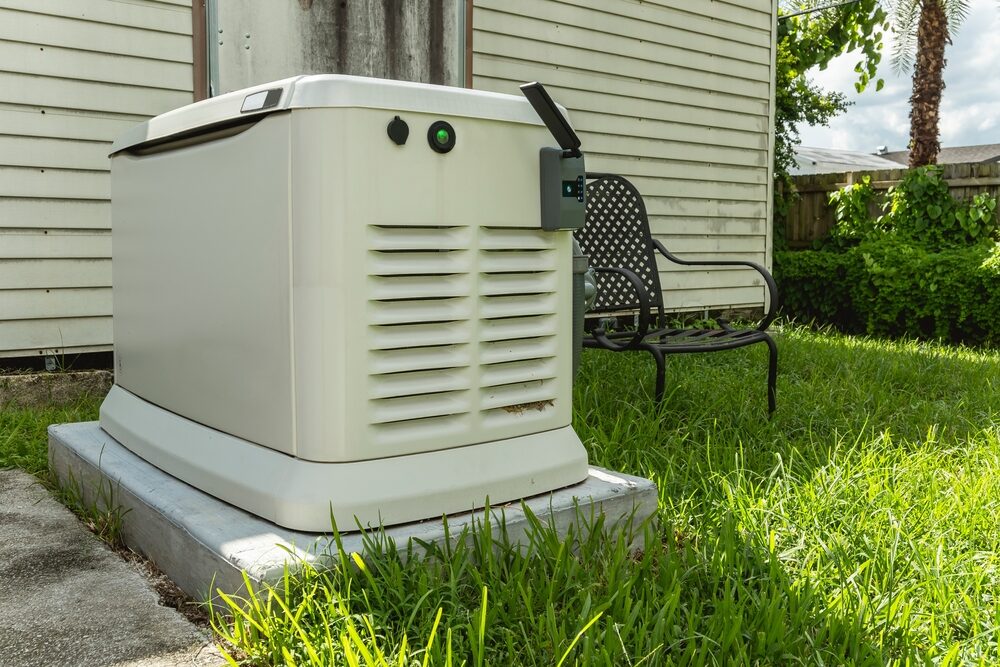Guide: Are Backup Generators Worth It?
Hint: A Backup Generator is Totally Worth it, Find Out
Wondering about the worth of backup generators? You’re not alone. In a world where power outages seem more frequent than ever – thanks to extreme weather or unexpected events – the question “are backup generators worth it” pops up regularly. It’s not just about making sure the lights stay on; it’s also about keeping a sense of normality when everything else seems to be in disarray. With an average ROI that hits staggering heights, according to some reports as high as 3800%, diving into what makes these machines tick isn’t just smart; it’s essential.
QG Smart Home offers generator installations in Montgomery County, PA, smart home installs, EV charge installation and more. Give us a call for a free estimate.
But let’s get real here – navigating through endless options from portable units to whole-home systems can feel like you’re trying to solve a puzzle without all the pieces. Yet, with potential threats ranging from spoiled groceries to basement floods lurking around every corner when power goes down, making this decision feels more pressing than ever.
What Are Backup Generators and How Do They Work?
A backup generator is your home’s plan B for electricity during a power outage. It’s a portable unit that steps in to keep your lights, fridge, and other essentials running when the main power supply cuts off. Unlike its standby cousin that jumps into action automatically, a backup generator requires a hands-on approach. You’ll need to start it manually and connect it to your appliances using extension cords. It’s a straightforward, temporary solution to keep your household humming until the main power returns.
Types of Backup Generators
Diving into the world of backup generators, you’re certainly not short on choices. The most common types are portable generators and standby generators. Portable generators are the more affordable choice. They’re a breeze to tote around, snug and neat, not to mention they can keep your must-have gadgets humming along. On the flip side, standby generators are permanently installed and can provide power to your entire home. They’re pricier but offer more convenience and capacity.
How Backup Generators Operate
So, how do these power-providing machines work their magic? Most backup generators run on gasoline, propane, or natural gas. When the power goes out, you fire up the generator, which converts the fuel into electricity. That electricity flows through the generator’s outlets, where you can plug in extension cords to power your appliances. Some standby generators can even connect directly to your home’s electrical system, automatically kicking in when the power goes out.
Benefits of Having a Backup Generator
In short, a backup generator isn’t just an appliance; it’s a resilience booster for your home, a guardian for your digital life, a defender of dinner, and a silent sentinel for your health and comfort. Storms, accidents, and power outages occur. When they do, will you be alone in the dark, or will you have alternatives? Among these alternatives are backup generators. So, you’ll come across various types each with its own price tag, but rest assured, they’re all worth the investment in the end.
Reasons to Invest in a Backup Generator
A backup generator is like your home’s trusty sidekick, ready to jump in when the main power takes an unexpected break. Here’s why having one is a bright idea: A generator is your fridge’s best friend during a blackout. It’s the hero that stops your ice cream from melting and keeps those special cuts of meat in your freezer just as fresh as you like them. But it’s not just about saving snacks. A backup generator can keep your sump pump running during a storm, preventing a flooded basement. It can power your furnace or air conditioner, maintaining a comfortable temperature in your home no matter the weather outside.
Maintaining Quality of Life
For those relying on medical devices, a backup generator isn’t just convenient; it’s essential. It ensures that critical healthcare equipment keeps running, offering peace of mind and safety when it’s needed most. Even if you don’t have medical needs, a generator can help maintain your quality of life during an outage. You can keep your phones and laptops charged, stay connected with loved ones, and even continue working from home if needed. If you live in an area prone to heavy rains or hurricanes, a backup generator can be a lifesaver. When the power goes out during a storm, your sump pump stops working. Without it, water can quickly flood your basement, causing extensive damage. A generator can keep your sump pump running, even during an extended outage. Putting a little money in now can save you from big repair bills and headaches later on.
Keeping Perishables Fresh
We’ve all experienced the dread of opening the fridge after a long power outage, bracing ourselves for the smell of spoiled food. With a backup generator, you can keep your perishables fresh and your stomach happy. A generator can power your refrigerator and freezer, preventing food waste and the hassle of restocking everything after an outage. This little luxury could be the game-changer your daily routine has been missing.
Choosing the Right Backup Generator for Your Needs
So, you’ve decided to invest in a backup generator. Great choice. But with so many options out there, how do you pick the perfect one for your home? Here are a few key factors to consider: The first step is to figure out how much power output you need. Make a list of the essential appliances and devices you want to keep running during an outage, and add up their wattage. A small portable generator can typically handle around 2,000 to 4,000 watts, enough for a few lights, a fridge, and a phone charger. A larger standby generator can produce 10,000 watts or more, enough to power your entire home.
Fuel Source Options
Next, consider your fuel source. Gasoline is readily available and portable generators usually run on gas. However, it has a short shelf life and can be dangerous to store in large quantities. Propane is another popular option. It has a longer shelf life than gasoline and is safer to store. Natural gas is a convenient choice for standby generators, as it connects directly to your home’s gas line. However, if the natural gas supply is disrupted during a disaster, your generator won’t be able to function.
Installation and Maintenance Costs
Don’t forget to factor in installation and maintenance costs when budgeting for your generator. Portable generators are relatively easy to set up and maintain, but standby generators require professional installation and regular servicing. Installation costs for a standby generator can range from a few thousand to over ten thousand dollars, depending on the size and complexity of the job. Annual maintenance can cost a few hundred dollars, but it’s essential to keep your generator in top shape and ready to go when you need it.
Standby Generators vs Portable Generators: Which is Better?
When it comes to backup power, you’ve got two main options: standby generators and portable generators. Both have their pros and cons, so let’s dive in and compare the two. Standby generators are the ultimate in convenience and reliability. They’re permanently installed outside your home and connected directly to your electrical system. When the power goes out, they automatically kick in within seconds, providing seamless backup power to your entire home. Standby generators are also more powerful than portable generators, capable of producing 10,000 watts or more. They run on natural gas or propane, so you don’t have to worry about refueling them during an outage.
Benefits of Portable Generators
Portable generators, on the other hand, are more affordable and flexible. You can move them around as needed and store them away when not in use. They’re perfect for powering a few essential appliances during a short outage or for taking on camping trips and tailgates. Portable generators typically run on gasoline and can produce 2,000 to 8,000 watts of power. They require manual setup and refueling, but they’re a great option if you don’t want to invest in a permanent standby generator.
Comparing Costs and Convenience
When it comes to cost, portable generators are the clear winner. You can get a decent portable generator for under $1,000, while standby generators can cost anywhere from $2,000 to $20,000 or more, depending on the size and features. However, standby generators offer unbeatable convenience and peace of mind. With a standby generator, you don’t have to worry about setting anything up or refueling during an outage. You can go about your daily life with minimal interruption, even during an extended power outage.
Is a Backup Generator Worth the Investment?
So, is a backup generator worth the cost? It depends on your specific needs and situation. Here are a few factors to consider: First, think about how often you experience power outages and how long they typically last. If you find yourself often in the dark because of long or frequent power outages, investing in a backup generator might just be a smart move. Consider what you need to power during an outage. If you work from home or have medical devices that require electricity, a generator is a must-have. If you just want to keep a few lights on and your phone charged, a smaller portable generator may suffice.
Considering Long-Term Benefits
While the upfront cost of a generator can be daunting, it’s important to consider the long-term benefits. A backup generator can provide peace of mind and safety during an outage, and it can even increase the value of your home. If you live in an area prone to natural disasters like hurricanes or wildfires, a generator can be a lifesaver. It can keep your family safe and comfortable until the power is restored.
Weighing Costs vs Peace of Mind
Ultimately, the decision to invest in a backup generator comes down to your personal priorities and budget. If you value uninterrupted power and peace of mind, a generator may be worth the cost. When considering a backup generator, it’s crucial to factor in these costs to get a comprehensive view of your investment. While the initial outlay might seem substantial, the peace of mind and comfort during power outages can make it a worthwhile investment.
Backup generators offer a reliable plan B during power outages, keeping essentials running. With options from portable to standby generators, they cater to various needs and budgets. They’re especially crucial for those relying on medical devices or living in areas prone to natural disasters. Weighing the cost against peace of mind is key when deciding if it’s worth the investment.
Conclusion
So there we have it—when storms rage outside and neighbors sit in darkness, those savvy enough to ask “are backup generators worth it” might just find themselves sipping hot coffee by lamplight instead of fretting over frozen pipes and dark screens. The truth spills out clear as day; while Hollywood has us fearing robots taking over our lives, maybe we’ve overlooked something simpler yet profoundly impactful—a reliable source of power that hums quietly behind scenes ensuring life marches on smoothly.
QG Smart Home is ready to help with your backup generator installations in Bucks County and surrounding area. Give us a call for a free estimate.
This quiet protector doesn’t look for a pat on the back but truly earns a shoutout for its role in bringing some much-needed steadiness to our often unpredictable lives. From safeguarding family dinners against interruption to preserving tranquility amidst turmoil—the verdict rings loud across households far and wide: Yes, they are absolutely worth considering.








